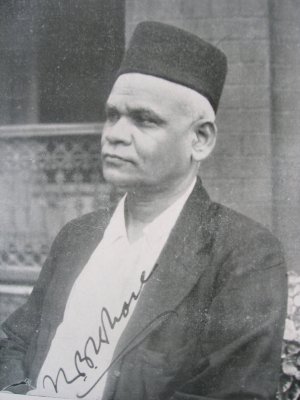N.B. Khare
Dr.Khare's uniqueness rests on a character formed by a life of selfless service and determined action.
His energy and boldness make him the peer of great leaders. He is one of the creators of the Congress triumph in the Central Provinces.
He strove for a united Congress Party and he succeeded in his effort. He desires no pulling down of stone edifices. For, tumult is not his element. Being the solidest of men, he is a born enemy of disorder.
Extremely practical, cautious, hopeful, quietly discerning, rough-tongued. Dr.Khare is remolding his province's ideal, which is leading to a strong and national development. Dr.Khare was born at Bhiwandi in 1884. His father Mr.Bhaskar Balla Khare was a lawyer with an unsteady income. Young Khare spent his youth in study and self-denial. He had poverty as a flower in his buttonhole.
Early in life he migrated to C.P and was brought up by his uncle at Jabbulpore. He was educated at Hitkarni High School and in 1902 graduated from the Government College. He secured the C.P government scholarship in Medicine and joined the Medical College, Lahore. In 1907 he took his degree in Medicine securing first rank. He won the Dr. Rahimkhan gold medal and another medal for Surgery.
K.L. Kamat/Kamat's Potpourri
Narayan Bhaskar Khare (1884-1970)
Educated as a physician, Khare was a Congressman and political leader
The same year he joined the provincial Medical College. The airs of the European snobbish apostates was wormwood to his pride. He never pocketed an affront but hurled many at them. In 1913 he obtained the M.D degree. He was the first M.D of the Punjab University. In 1916 he resigned his post with view to set up private practice. The amount he realized by selling the furniture gave him a nice start. Very soon his fame reached spiral heights. As a physician he was renowned for his great skill and genuine sympathy.
Fearless independent is a true trait in the character of Dr.Khare. This streak in his nature which was prominent in his boyhood became more pronounced in his later life.
When he was an undergraduate in the Government College he was asked to write an essay on the "Blessings of British Rule To India". The future Premier of C.P wrote with great gusto…. He gave a vivid account of the curses of British Imperialism and how it was gnawing away our very vitals. The Principal, Mr. Browning read the essay. It was hard for hard meat for him to digest. He became the flaming pillar of wrath.
His essay breathed sedition. So he was asked to give an explanation. As a consequence Nationalist journals like Amrit Bazar Patrika and Kesari were not allowed to be subscribed by the library.
Imbued with Gandhian spirit he interested himself in politics. He became the trusted lieutenant of Narakesari Abhayankar. H played a notable part in imparting fresh vigour to the Congress movement in C.P.
Form 1923-30 he was the prominent member of the C.P Legislative Council. In 1930 he participated in the Civil Disobedience movement. With inflexible purpose, untiring zeal and practical shrewdness he devoted himself to the Congress cause.
His deadly earnestness almost bordered on fanaticism. But it was saved from it by a gay sense of humour.
In 1930 he was imprisoned but was released before the expiry of the term on ground of health. After the sad demise of Abhayankar he was elected unopposed to the Central Assembly where he succeeded in placing the Arya Marriage Validation Bill on the Statute Book. More often than not he is a member of the A.I.C.C. he was elected the President of the joint parliamentary Board in C.P. he conducted the election campaign with unsurpassed vigour. As a mark of high esteem he was unanimously elected the leader of the Congress Party in the Assembly.
Lured by the smell of cold print he took up to journalism. He edited a Marathi Journal "Tarun Bharat" with marked ability.
He had to cease its publication when Civil Disobedience was started but its influence was not ceased to glow.
He is now the Prime Minister of the Central Provinces. He is the guide of its destiny at the most formative period of its history and posterity will honour him as a roving pioneer in the realms of constructive politics.
![]()

